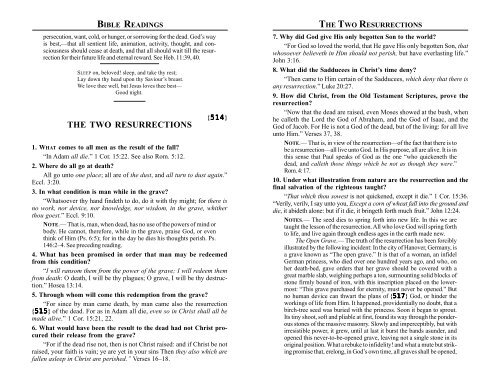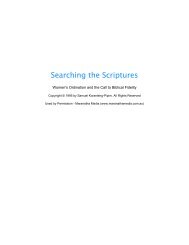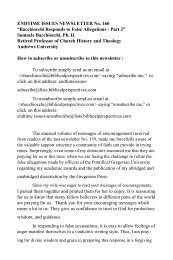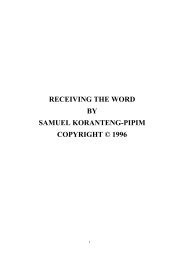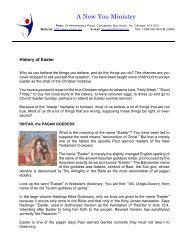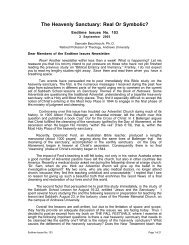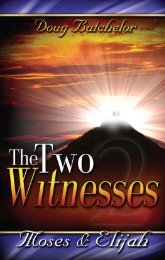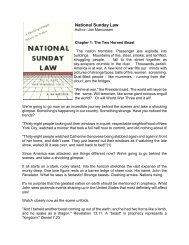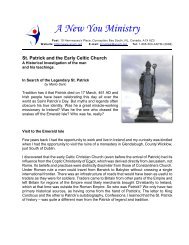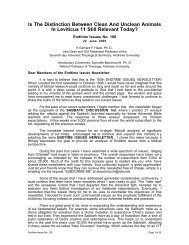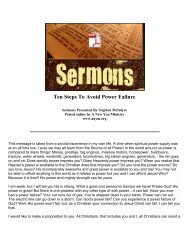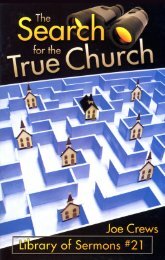Bible Readings for the Home Circleâ1914 - A New You Ministry
Bible Readings for the Home Circleâ1914 - A New You Ministry
Bible Readings for the Home Circleâ1914 - A New You Ministry
You also want an ePaper? Increase the reach of your titles
YUMPU automatically turns print PDFs into web optimized ePapers that Google loves.
BIBLE READINGS<br />
persecution, want, cold, or hunger, or sorrowing <strong>for</strong> <strong>the</strong> dead. God’s way<br />
is best,—that all sentient life, animation, activity, thought, and consciousness<br />
should cease at death, and that all should wait till <strong>the</strong> resurrection<br />
<strong>for</strong> <strong>the</strong>ir future life and eternal reward. See Heb. 11:39, 40.<br />
SLEEP on, beloved! sleep, and take thy rest;<br />
Lay down thy head upon thy Saviour’s breast.<br />
We love <strong>the</strong>e well, but Jesus loves <strong>the</strong>e best—<br />
Good night.<br />
THE TWO RESURRECTIONS<br />
{514<br />
514}<br />
1. WHAT comes to all men as <strong>the</strong> result of <strong>the</strong> fall<br />
“In Adam all die.” 1 Cor. 15:22. See also Rom. 5:12.<br />
2. Where do all go at death<br />
All go unto one place; all are of <strong>the</strong> dust, and all turn to dust again.”<br />
Eccl. 3:20.<br />
3. In what condition is man while in <strong>the</strong> grave<br />
“Whatsoever thy hand findeth to do, do it with thy might; <strong>for</strong> <strong>the</strong>re is<br />
no work, nor device, nor knowledge, nor wisdom, in <strong>the</strong> grave, whi<strong>the</strong>r<br />
thou goest.” Eccl. 9:10.<br />
NOTE.— That is, man, when dead, has no use of <strong>the</strong> powers of mind or<br />
body. He cannot, <strong>the</strong>re<strong>for</strong>e, while in <strong>the</strong> grave, praise God, or even<br />
think of Him (Ps. 6:5); <strong>for</strong> in <strong>the</strong> day he dies his thoughts perish. Ps.<br />
146:2–4. See preceding reading.<br />
4. What has been promised in order that man may be redeemed<br />
from this condition<br />
“I will ransom <strong>the</strong>m from <strong>the</strong> power of <strong>the</strong> grave; I will redeem <strong>the</strong>m<br />
from death: O death, I will be thy plagues; O grave, I will be thy destruction.”<br />
Hosea 13:14.<br />
5. Through whom will come this redemption from <strong>the</strong> grave<br />
“For since by man came death, by man came also <strong>the</strong> resurrection<br />
{515<br />
515} of <strong>the</strong> dead. For as in Adam all die, even so in Christ shall all be<br />
made alive.” 1 Cor. 15:21, 22.<br />
6. What would have been <strong>the</strong> result to <strong>the</strong> dead had not Christ procured<br />
<strong>the</strong>ir release from <strong>the</strong> grave<br />
“For if <strong>the</strong> dead rise not, <strong>the</strong>n is not Christ raised: and if Christ be not<br />
raised, your faith is vain; ye are yet in your sins Then <strong>the</strong>y also which are<br />
fallen asleep in Christ are perished.” Verses 16–18.<br />
THE TWO RESURRECTIONS<br />
7. Why did God give His only begotten Son to <strong>the</strong> world<br />
“For God so loved <strong>the</strong> world, that He gave His only begotten Son, that<br />
whosoever believeth in Him should not perish, but have everlasting life.”<br />
John 3:16.<br />
8. What did <strong>the</strong> Sadducees in Christ’s time deny<br />
“Then came to Him certain of <strong>the</strong> Sadducees, which deny that <strong>the</strong>re is<br />
any resurrection.” Luke 20:27.<br />
9. How did Christ, from <strong>the</strong> Old Testament Scriptures, prove <strong>the</strong><br />
resurrection<br />
“Now that <strong>the</strong> dead are raised, even Moses showed at <strong>the</strong> bush, when<br />
he calleth <strong>the</strong> Lord <strong>the</strong> God of Abraham, and <strong>the</strong> God of Isaac, and <strong>the</strong><br />
God of Jacob. For He is not a God of <strong>the</strong> dead, but of <strong>the</strong> living: <strong>for</strong> all live<br />
unto Him.” Verses 37, 38.<br />
NOTE.— That is, in view of <strong>the</strong> resurrection—of <strong>the</strong> fact that <strong>the</strong>re is to<br />
be a resurrection—all live unto God. In His purpose, all are alive. It is in<br />
this sense that Paul speaks of God as <strong>the</strong> one “who quickeneth <strong>the</strong><br />
dead, and calleth those things which be not as though <strong>the</strong>y were.”<br />
Rom. 4: 17.<br />
10. Under what illustration from nature are <strong>the</strong> resurrection and <strong>the</strong><br />
final salvation of <strong>the</strong> righteous taught<br />
“That which thou sowest is not quickened, except it die.” 1 Cor. 15:36.<br />
“Verily, verilv, I say unto you, Except a corn of wheat fall into <strong>the</strong> ground and<br />
die, it abideth alone: but if it die, it bringeth <strong>for</strong>th much fruit.” John 12:24.<br />
NOTES.— The seed dies to spring <strong>for</strong>th into new life. In this we are<br />
taught <strong>the</strong> lesson of <strong>the</strong> resurrection. All who love God will spring <strong>for</strong>th<br />
to life, and live again through endless ages in <strong>the</strong> earth made new.<br />
The Open Grave.— The truth of <strong>the</strong> resurrection has been <strong>for</strong>cibly<br />
illustrated by <strong>the</strong> following incident: In <strong>the</strong> city of Hanover, Germany, is<br />
a grave known as “The open grave.” It is that of a woman, an infidel<br />
German princess, who died over one hundred years ago, and who, on<br />
her death-bed, gave orders that her grave should be covered with a<br />
great marble slab, weighing perhaps a ton, surmounting solid blocks of<br />
stone firmly bound of iron, with this inscription placed on <strong>the</strong> lowermost:<br />
“This grave purchased <strong>for</strong> eternity, must never be opened.” But<br />
no human device can thwart <strong>the</strong> plans of {517<br />
517} God, or hinder <strong>the</strong><br />
workings of life from Him. It happened, providentially no doubt, that a<br />
birch-tree seed was buried with <strong>the</strong> princess. Soon it began to sprout.<br />
Its tiny shoot, soft and pliable at first, found its way through <strong>the</strong> ponderous<br />
stones of <strong>the</strong> massive masonry. Slowly and imperceptibly, but with<br />
irresistible power, it grew, until at last it burst <strong>the</strong> bands asunder, and<br />
opened this never-to-be-opened grave, leaving not a single stone in its<br />
original position. What a rebuke to infidelity! and what a mute but striking<br />
promise that, erelong, in God’s own time, all graves shall be opened,


